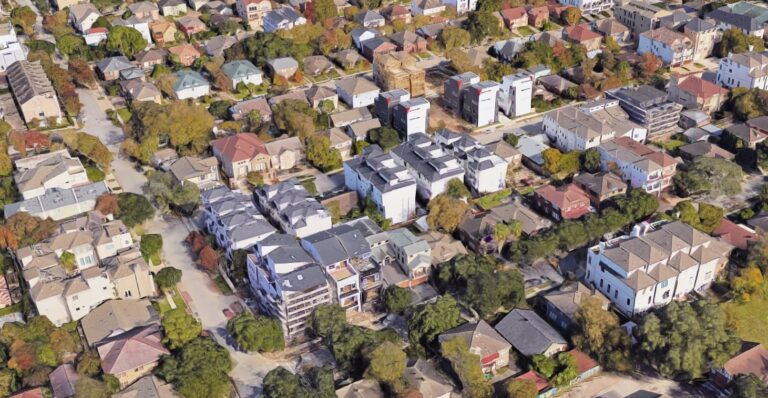Physical Address
304 North Cardinal St.
Dorchester Center, MA 02124
Physical Address
304 North Cardinal St.
Dorchester Center, MA 02124
At a recent webinar, Prof. Christopher Serkin of Vanderbilt Law School made an interesting argument. He pointed out that a) Sun Belt cities tend to have less restrictive zoning than northern cities; b) Sun Belt cities also have more homeowners’ associations (HOAs) with restrictive rules; and therefore (c) perhaps zoning reform will fail because homeowners will react to restrictive zoning by creating more HOAs, which will limit density and housing supply just as much as zoning. It seems to me that this argument has some weak links. The most obvious is that it is not clear that the correlation he points out really exists. Admittedly, northern and midwestern states have fewer HOAs than the rest of the nation. In the Northeast, only 29 percent of new homes are part of HOAs, as opposed to 47 percent in the Midwest, and 2/3 in the South. But not all southern and western states are the same- and if we go state-by-state, the correlation between HOAs and strict zoning starts to disappear. In particular, California metros are notorious for strict land use regulation and high housing costs. But 64.9% of California homeowners belong to an HOA, well above the national average. In fact, only three states (Vermont, DC and Florida) have higher HOA participation rates than California. On the other hand, Texas metros tend to be less restrictive, but only 1/3 of Texas homeowners belong to a HOA. Similarly, only 15 percent of Tenneseee homeowners belong to an HOA. So its not quite clear that metros with lower housing costs and/or less zoning have higher HOA participation rates. ( On the other hand, this data would be more useful if we were able to a) distinguish between new subdivisions and the rest of the housing market, b) distinguish between HOA participation rates for […]

In most of my discussions of Houston here on the blog, I have always been quick to hedge that the city still subsidizes a system of quasi-private deed restrictions that control land use and that this is a bad thing. After reading Bernard Siegan’s sleeper market urbanist classic, “Land Use Without Zoning,” I am less sure of this position. Toward this end, I’d like to argue a somewhat contrarian case: subsidizing private deed restrictions, as is the case in Houston, is a good idea insomuch as it defrays resident demand for more restrictive citywide land-use controls. For those of you who haven’t read my last four or five wonky blog posts on land-use regulations in Houston (what else could you possibly be doing?), here is a quick refresher. Houston doesn’t have conventional Euclidean zoning. Residents voted it down three times. However, Houston does have standard subdivision and setback controls, which serve to reduce densities. The city also enforces high minimum parking requirements outside of downtown. On top of these standard land-use regulations, the city heavily relies on private deed restrictions. Also known as restrictive covenants, these are essentially legal agreements among neighbors about how they can and cannot use their property, often set up by a developer and signed onto as a condition for buying a home in a particular neighborhood. In most cities, deed restrictions cover superfluous lifestyle preferences not already covered by zoning, including lawn maintenance and permitted architectural styles. In Houston, however, these perform most of the functions normally covered by zoning, regulating issues such as permissible land uses, minimum lot sizes, and densities. Houston’s deed restrictions are also different in that they are heavily subsidized by the city. In most cities, deed restrictions are overseen and enforced by parties to a deed, typically organized as a […]

Houston doesn’t have zoning. As I have written about previously here on the blog, this doesn’t mean nearly as much as you would think. Sure, Houston’s municipal government doesn’t segregate uses or expressly regulate densities. But as my Market Urbanism colleague Michael Lewyn has documented, city officials do regulate lot sizes, setbacks, and parking requirements. They also enforce private deed restrictions, which blanket many of the city’s residential neighborhoods. A deed restriction is a legal agreement among neighbors about how they can and cannot use their property. In most cities, deed restrictions are purely private and often fairly marginal, adding rules on top of zoning that property owners must follow. But in Houston, deed restrictions do most of the heavy lifting typically covered by zoning, including delineating permissible uses and design standards. Whenever I point out that Houston has relatively light land-use regulations (and is enjoying the benefits), folks often respond that the city’s deed restrictions are basically zoning. This couldn’t be further from the truth. Before I turn to the essential differences, it’s worth first observing how Houston’s deed restrictions are like any other city’s zoning. First, like zoning, Houston’s deed restrictions are almost universally designed to prop up the values of single-family houses. Despite the weak evidence for a use segregation-property values connection, this justification for zoning goes back to the program’s roots in the 1920s. Many of Houston’s nicest residential neighborhoods, like River Oaks and Tanglewood, follow this line of thinking, enforcing tight deed restrictions on residents that come out looking a lot like zoned neighborhoods in nearby municipalities like Bellaire and Jersey Village. Second, both zoning and Houston’s deed restrictions are enforced by government officials at taxpayer expense. In most other cities, deed restrictions are overseen and enforced by a private group like a homeowners association, […]